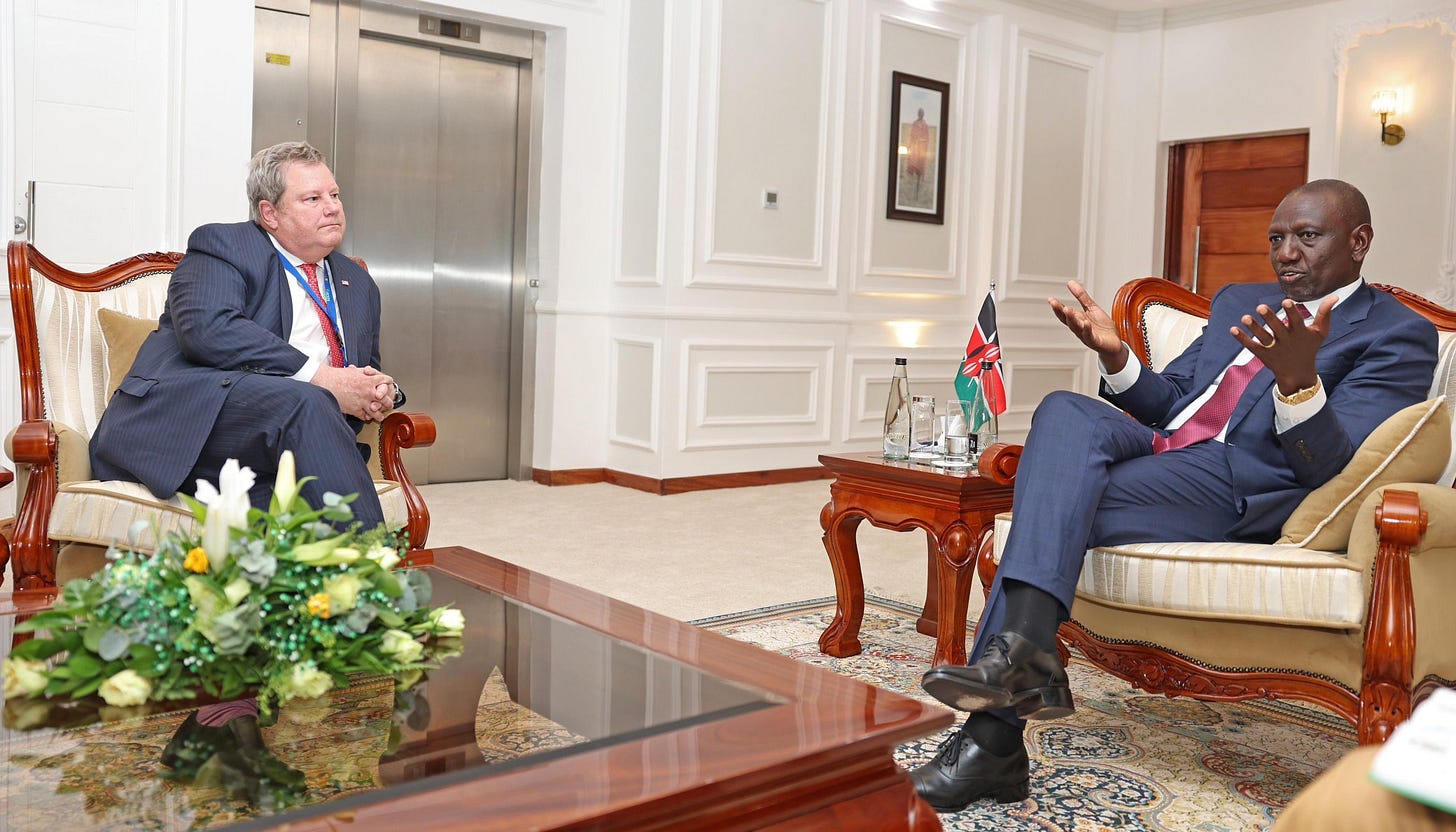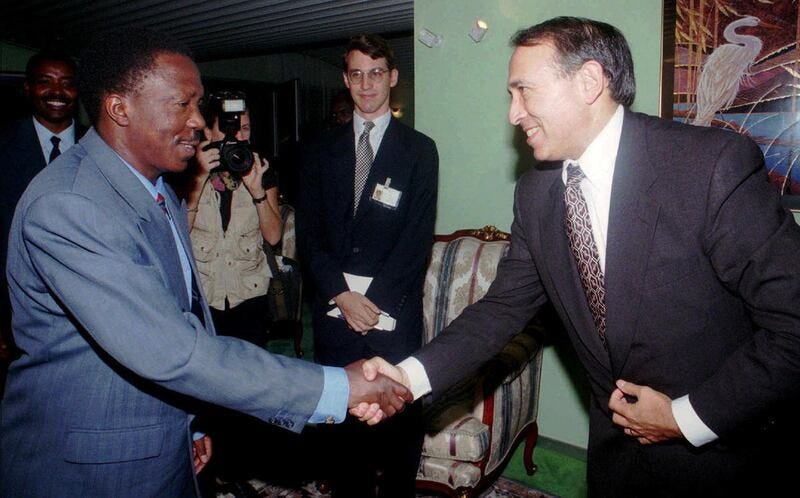Before I rejoined the U.S. government in 2021, I published an essay with Colin Thomas-Jensen about the merits of appointing envoys. We intended to inform the debate within the new Biden administration about whether to appoint a Horn of Africa envoy and to spell out the conditions under which that individual could succeed. We were broadly supportive of the idea, even though we knew the record of envoys had been uneven. As President Biden’s Special Assistant and Senior Director for African Affairs, I ended up working with three Horn of Africa envoys and facilitated the appointment of a Sudan envoy. Based on that experience, I think we need to reconsider the entire approach.

In our piece, Colin and I listed five necessary conditions for success: (1) access to power; (2) solid working relationships at the State Department and USAID; (3) ownership of the policy within the interagency; (4) robust staffing; and (5) control over resources. To inform our recommendations, we considered the record of past envoys, such as President Nixon’s appointment of Clarence “Clyde” Ferguson as the U.S. special coordinator on relief to the civilian victims of the Nigerian civil war. We also drew on personal experiences working with U.S. presidential special envoy for Sudan and South Sudan Princeton Lyman. Unfortunately, none of our envoys (Jeffrey Feltman, David Satterfield, Mike Hammer, and Tom Perriello) consistently operated under these optimal conditions. And, even if they had, I’m not sure it would have been sufficient.
The Blame Game
There were several reasons why our envoys had less influence than they needed to succeed in their roles. Some of it was structural: President Biden only appointed a handful of special presidential envoys, and most of the administration’s special envoys reported to their respective assistant secretary of state, not Secretary of State Tony Blinken. This led to envoys who couldn’t drive policy or secure the engagement of higher-ups to resolve critical issues. In other words, their authority seemed more symbolic than substantive. The stagecraft was telling; National Security Advisor Jake Sullivan issued a statement that acknowledged the Department of State’s appointment of Jeff Feltman as the inaugural Special Envoy for the Horn of Africa. That courtesy wasn’t extended to Satterfield, Hammer, or Perriello.
Another challenge was related to resources. Our envoys weren’t provided with sufficient budgets to do their job. They had to beg and barter for additional staff from regional and functional bureaus, as well as detailees from other departments and agencies. In general, they rarely had more than four people working directly for them, while the deputy assistant secretary for East Africa, Sudan, and South Sudan supervised a much larger group of diplomats responsible for covering the region. The lack of resources limited the envoys’ ability to oversee the implementation of agreements or even communicate effectively; one envoy couldn’t even manage to convince the powers that be to grant him a social media handle. (Just to belabor the point: Princeton Lyman had more than 20 U.S. diplomats and civil servants under his supervision, discretion over several program accounts; and a deputy who was a former ambassador.)
In addition, these structural and resource challenges intensified bureaucratic infighting. Several of the envoys had testy relations with other parts of the interagency. It forced everyone to spend too much time fixing interpersonal relations and massaging egos, as opposed to advancing substantive goals. Instead of being a value-added, their very existence sometimes became a distraction. I don’t care to admit how much time I wasted on the phone trying to convince people to forget the drama and focus on the task at hand.
Mission Creep
In retrospect, we failed at a more fundamental level. We didn’t have a clear vision for what these envoys were supposed to do — and didn’t consider how an envoy would fit into discreet diplomatic processes, especially when they initially didn’t exist. In our essay, Colin and I presented an almost impossible list of priorities to pursue—everything from demobilizing militias and steering Ethiopia back toward the path of inclusive elections to negotiating a peaceful resolution to the Grand Ethiopian Renaissance Dam (GERD) dispute.
That’s certainly too much for a small shop, even one that is working productively with the regional bureau and the U.S. embassies in the region, as well as our diplomats responsible for relations with Europe and the Gulf. It became infinitely more difficult following the coup in Sudan in October 2021 and outbreak of the Sudanese civil war in April 2023.
And, as the crises metastasized, we did exactly what Colin and I previously warned against: the envoys became a cheap way to respond to domestic and foreign pressure. It gave the appearance of momentum where there wasn’t much to speak of. What was most problematic was the appointment of a special envoy for Sudan in early 2024—a Hail Mary attempt to resolve deep divisions within the interagency over the policy direction. That was never going to be a recipe for success.
Easy Fixes
Reflecting on my experience, I have a few amendments to the recommendations that Colin and I outlined in 2021. These may seem fairly obvious, but they’re crucial. The White House and State Department should build a cohesive team; agree on a division of labor; define a discrete problem to address; and pick the right person for the gig.
The envoy’s relationship with the rest of the government is essential. Everyone must be on board or the whole effort will fail. President Obama's special envoy to Sudan, retired Maj. Gen. Scott Gration, openly clashed with other senior officials, leading to his removal and reassignment as U.S. ambassador to Kenya. By contrast, Princeton Lyman was an experienced Africa hand with whom Obama publicly affirmed “had the full support of the White House.”
An envoy should know their lane. I went to meetings where the U.S. delegation included the assistant secretary, the NSC senior director, the envoy, an ambassador, and even a deputy assistant secretary—all to engage with just one foreign counterpart. This undermined the envoy’s authority, and it simply wasn’t a good use of time for a group of very busy people.
The envoy’s tasks should be focused and tangible. We have a tendency to ask envoys to tackle interlocking regional crises or more conceptual issues, such as President Clinton’s appointment of Jesse Jackson as Special Envoy for the President and the Secretary of State for the Promotion of Democracy in Africa. I’m not sure what that even entailed besides a lot of travel and some controversial moves in Nigeria.
The envoy needs to have the right personality, not just the right political profile. Mike Hammer, our third envoy for the Horn of Africa, was a dynamo and pulled off some audacious diplomatic moves, including facilitating the Cessation of Hostilities Agreement (CoHA) in Ethiopia. In the same vein, former Congressman Howard Wolpe’s deep expertise and tireless efforts helped usher in the Arusha Accords in Burundi.
A Different Model
If easy fixes aren’t possible, then we should consider a different approach. For instance, you can follow the Richard Holbrooke model where you, as the top diplomat for the region, spend the majority of your time focused on the problem set. That might even entail weeks in Dayton, Ohio or some foreign location to address the crisis. To do this though, you need to make sure you have the necessary expertise with you, and that your team is empowered to make decisions without you on the rest of the portfolio.
Alternatively, you can name envoys with more narrow responsibilities, such as President Biden’s envoys charged with coordinating Middle East humanitarian issues or leading on Ukraine’s economic recovery. The idea is to identify challenges that our ambassadors or even U.S. officials back in Washington don’t have the bandwidth to manage. For example, I was very fortunate that President Biden appointed Ambassador Johnnie Carson as Special Presidential Representative for U.S.-Africa Leaders Summit Implementation.
Let me be clear: we can’t expect an envoy to solve bureaucratic or structural problems. You want an envoy to add capacity, not duplicate responsibilities. It seems unsustainable, for example, for President Trump’s Special Advisor on Africa, Massoud Boulos, to lead negotiations between the Democratic Republic of the Congo and Rwanda, while having responsibilities for other issues in the region and serving as senior advisor to the president on Arab and Middle Eastern affairs. Even if there is progress — including the very welcomed signing of the DRC-Rwanda Peace Agreement in late June—that’s simply too much turf. There’s no way one can consistently make progress as a one-man shop.

Post-Strategy
I continue to see real merit in tapping envoys to support U.S. diplomacy and help advance shared interests in the region. There are simply too many hotspots for national security leaders to tackle on their own — a dynamic made extraordinarily worse by the recent reductions-in-force at the State Department and the dismantling of USAID.
It must be a priority for the administration. It can’t be a Pavlovian response to every crisis or geopolitical challenge. We certainly shouldn’t use envoys to make end runs around the State Department. As President Reagan’s Assistant Secretary of State for African Affairs Chet Crocker said to me on the Into Africa podcast in July 2021: you can’t outsource your strategy “to some special envoy who’s disconnected from reality, apart from his or her special envoy status.”
We need to be smarter, defining the problem we are seeking to resolve and investing a prospective envoy with sufficient authority, staff, and resources to get the job done. There is considerable need, and at least historically we have had good intentions. The challenge, as Colin and I warned four years ago, is getting it right, and too often the U.S. government doesn’t.






Interesting article, Judd. It provided me with some new material to think about.
Regards
Should there be a de facto (or de jure... is there a Congressional role here?) understanding that envoys can't be created unless they report to the president or the secretary... and/or that they have discrete, non overlapping responsibilities with regional folks? Just strikes me that, of your examples and those from my own (much more limited) experience, the more "successful" ones had discrete responsibilities, not broad regional (eg Horn of Africa) responsibilities. The others (resourcing/staffing, relationships/ability to work the interagency) are obviously of critical importance but are also common across government... Defining (narrowly if necessary) the focus/intended outcomes seems like something we can/should be able to fix.